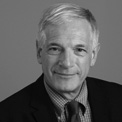PRESIDENT'S ESSAY

MacArthur Foundation Former President, Robert L. Gallucci
Contributing to a Stronger American Democracy
The Voting Public
True citizenship requires active, informed participation. Yet many Americans either do not vote or vote with partial and inaccurate understanding of the issues at stake.
MacArthur has for decades supported public media and high-quality documentaries that explore current events and contemporary problems with depth and nuance. We have continued to award grants to investigative reporting and news programs that offer sound analysis and reasoned discussion in political life, including All Things Considered, PBS NewsHour, and FRONTLINE, and the investigations of ProPublica, the Center for Investigative Reporting, and the Center for Public Integrity.
To stimulate broader engagement, in 2013 we funded the Illinois Humanities Council to launch [email protected], a nationwide competition for digital media pieces about strengthening American democracy.
Too many students, particularly in large urban school systems, are not being adequately equipped for the responsibilities of citizenship.
All of these efforts presume an audience of voters that is educated and interested enough to make use of them. But we know that too many students, particularly in large urban school systems, are not being adequately equipped for the responsibilities of citizenship.
MacArthur is helping to shape a new movement that aims to transform both how young people learn and how our institutions of learning operate – and to enable young people to become more active participants in society.
The Foundation had worked in traditional school reform without great success in earlier years. Seven years ago, we decided to take a different approach altogether, looking instead at how their experience of digital media was influencing how young people learn and engage with society.
The field is fluid and rapidly changing, but we think key principles are emerging. MacArthur-supported research found that young people are deeply involved in online activities, mostly out of school; they are learning in an often self-directed way, closely connected to peers with similar interests. Interest and engagement are powerful motivators that, connected to the traditional aims of education, can redefine pedagogy.
At the heart of this work is the notion of “connected learning,” which says that the most robust learning occurs at the intersection of young people’s interests, their peer culture, and academics, or when connections are made among them. While digital media certainly is not required for “connected learning,” it facilitates it and makes it available for many more youth.
We have funded work to enable and study these possibilities. In New York City and Chicago, we support schools that use the principles of game design, systems thinking, and, when it makes sense, digital platforms. Through a large-scale partnership with the federal Institute of Museum and Library Services, we are supporting spaces in cultural institutions across the country where kids can engage with mentors, use equipment, books, and music to experiment and “geek out” together. And in Hive Learning Networks in an increasing number of cities, cultural institutions, schools, out-of-school programs, and online spaces are coordinating projects and programs for young people.
This notion of “connected learning” holds promise not only for learning, but also for engaged citizenship. It is at the core of the efforts of the MacArthur Research Network on Youth and Participatory Politics, which is exploring how new information and communication technologies can prepare students to be informed, engaged, and effective actors in public life and what it means to be a contributing citizen in the 21st century.
Early findings from the network’s national survey show that substantial numbers of young people across racial and ethnic groups are engaging in acts of participatory politics – acts that are interactive, peer-based, not guided by deference to formal institutions, and that address issues of public concern. This is promising, as we seek to encourage young people to take part in their communities and work to improve society more broadly.